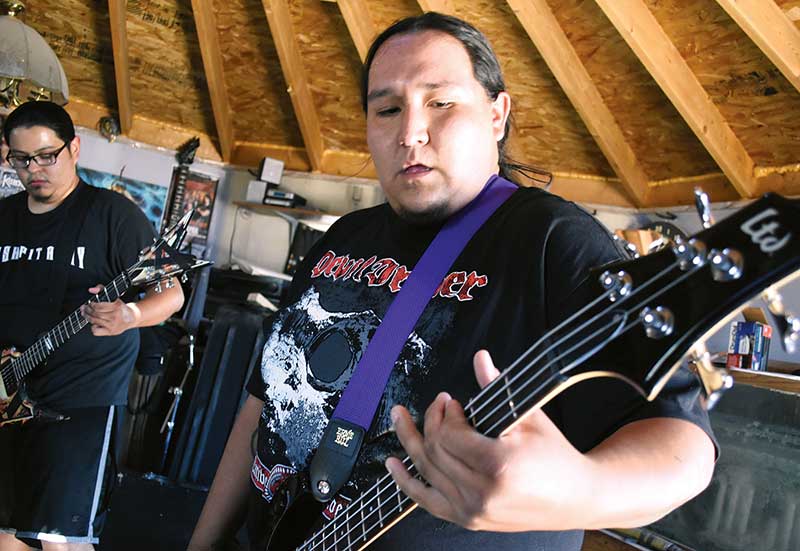
Navajo heavy metal band to go international

Navajo Times | Ravonelle Yazzie I Dont Konform bass player Brett Begay of Fort Defiance, Ariz., plays his bass guitar on Monday afternoon during a rehearsal session with Grammy-winning producer Flemming Rassmussen in Window Rock.

Navajo Times | Ravonelle Yazzie
I Dont Konform bass player Brett Begay of Fort Defiance, Ariz., plays his bass guitar on Monday afternoon during a rehearsal session with Grammy-winning producer Flemming Rassmussen in Window Rock.
WINDOW ROCK
A legendary producer cramped inside a hogan off Arizona 264 with a Navajo heavy metal band on the brink of going international took no quarter from the deafening blast of the amps.
He took it in – lived inside the noise.
Flemming Rasmussen scribbled notes, bounced his knee with the rhythm, and paid close attention to the heavy riffs and beats from I Don’t Konform during a rehearsal on June 20.
As producer of iconic Metallica albums “Ride the Lightning,” “Master of Puppets,” and “…And Justice For All,” Rasmussen wanted to experience the band in their own backyard, get a feel for their sound, and make a few suggestions before he takes on producing their first album. He wanted to maintain a singular focus in his suggestions – “the band’s mission” as he put it.
“It’s what they want to express that we need to get out through the speakers,” Rasmussen said.
In an interview between sessions with the band, he said the raw emotion and the thematic anger running through the music stood out as something real – something true to the life of the band.
“I like the aggression of it, again. It’s the subtle things that does it for me,” he said.
Rasmussen arrived in town Sunday to begin working with IDK to unlock the sound they will record when the band travels to Rasmussen’s hometown, Copenhagen, Denmark. The producer said he came to the Navajo Nation to see the band in their homeland in preparation for recording sessions of their first album from June 27 through July 11.
“That’s the reason I flew over here,” he said. “It’s a lot easier for me to know where they come from to find out what the final outcome is going to be.”
Rasmussen said with a few tweaks, he’s confident the band can produce an album with broad appeal beyond the niche of the garage band scene.
“We can do a total underground album, which will sell two copies, which is to Mom and Dad,” he said. “But it would be nice to do something that maybe gets a broader appeal, and maybe tell America what’s going on on the reservations.”
When the Grammy-winning metal producer heard the sound of I Don’t Konform, a specific technical element isn’t what stood out. Rasmussen heard their work when lead singer and guitarist Kyle Felter, 28, of St. Michaels, reached out to him in an email early in 2016. Rasmussen said he heard an authentic anger in the sound Felter shared with him. He recalled thinking about it and speaking to people about it, even on the plane to the United States.
“I spoke to a couple of American people on the plane, and they weren’t too proud when they heard I was going here,” he said. “Their thought was that they gave the Native Americans a really bad deal.”
Rasmussen identified the resounding anger as something he wanted to tap into with the band. He said he had been reading up on Navajo culture and the situation on reservations.
“That’s what I want to come out once the album is done – that anger about the way they have been treated, and the whole situation here, which is something I know very little about, but I can only watch and learn for myself,” he said.
He said to an extent he seeks storytellers.
“There’s some people who have stories to tell that I instantly pick up on,” he said. “The pop thing where you just do the random ‘Oh, I feel sad today’ doesn’t really appeal to me. I like when people have more to say than just, ‘Oh, somebody didn’t like me on Facebook,’” he said.
One of Rasmussen’s most successful songs told a very clear story of pain and suffering from the perspective of a wounded veteran, who directed anger at himself.
Rasmussen won Metallica a Grammy in 1990 for producing the song “One” on the “…and Justice for All” album. Even with that level of credentialed ability, he said the point of working with the band wasn’t to manifest his own sound into the music of IDK.
“I have this thing that I always feel that it’s the band’s mission that needs to come out,” Rasmussen said. “I’m trying to get what the band wants to come out in the final result. I don’t have a ‘sound’ as such, so I don’t have like a shape I kind of press down over the band like a mold, and then everything sounds the same.”
He focuses his energy on what a musician calls arrangements, which the band manager described as transitions between elements such as the intro to the song and when different instruments come in.
“There’s a lot with the arrangements and stuff that I wanted to change, so that’s what we’re doing,” Rasmussen said. “We’re rehearsing now to make sure that everything is the way we want it when we go into the studio.”
The bass player Brett Begay pushes his skills by practicing Mexican guitar styles in an intellectual approach to his music, but working with Rasmussen unlocked some hidden room of potential. He experienced it when his skills seemed to click with a suggestion from Rasmussen.
“It freaked me out,” Begay said. “I was jamming out and my eyes just went wide open, and I was like, ‘Whoa am I playing this?’ It felt like someone just kicked the door down.”
Band manager Jerold Cecil said normally the lead singer writes and arranges the music for the band, but having a professional of Rasmussen’s caliber had markedly improved the quality of the arrangements of the songs the band rehearsed – even only a few hours into working with the producer.
“On the first time they did ‘Hungry for War,’ I noticed a huge difference,” Cecil said. “There’s a big difference having an actual professional arrange these songs. It sounds clean. It doesn’t sound cluttered. It sounds like everything is supposed to fit.”
Cecil said the album “You Gotta Live Fast to Play Fast,” based on a quote from Felter’s deceased cousin, should hit next fall.
“We are working with one of the best producers in the world, and come next week, IDK will be international recording artists,” he said. “No one can ever take that away from them.”
To read the full article, pick up your copy of the Navajo Times at your nearest newsstand Thursday mornings!
Are you a digital subscriber? Read the most recent three weeks of stories by logging in to your online account.







 Highway 264,
Highway 264, I-40, WB @ Winslow
I-40, WB @ Winslow